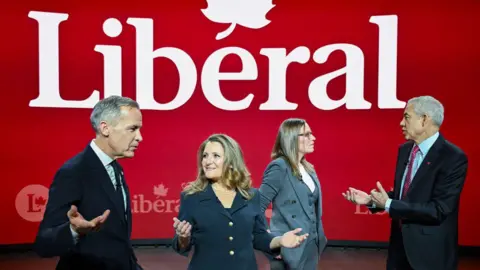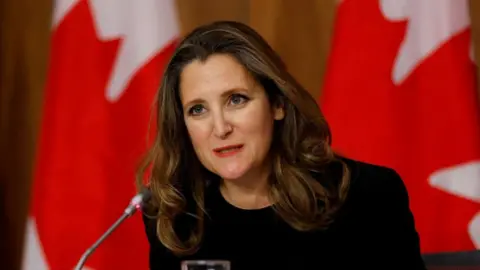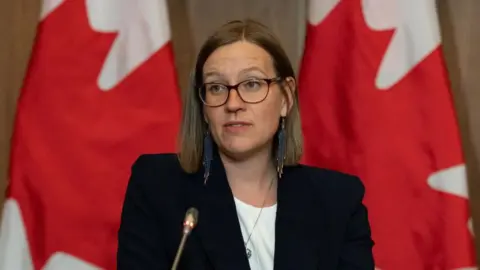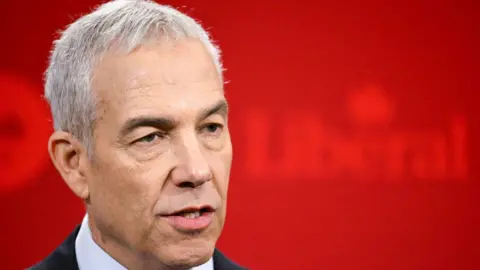Who is in the running to replace Trudeau as Liberal Party leader?
 Getty Images
Getty ImagesCanada's governing Liberal Party will announce on Sunday who will take over from Justin Trudeau as leader, after a crucial vote that will change the face of Canadian politics.
About 140,000 of the party's members have been voting for their preferred candidate, with results expected to be announced around 18:00 EDT (22:00 GMT).
The new leader will become the country's prime minister. But because the Liberals are a minority government, holding onto the top job will require winning a general election, which could be called in the coming weeks.
Whoever replaces Trudeau will have to grapple with US President Donald Trump's threats against Canada, which include an escalating trade war and repeated calls to make the country the US's "51st state".
The issue has dominated the campaigns of all four candidates vying for the top job. Here's what to know about them.
Former central banker Mark Carney
Former Bank of Canada and Bank of England governor Mark Carney has pitched himself as a strong fiscal manager who can help countries navigate challenging times, including his own.
"I've helped manage multiple crises, and I've helped save two economies," he said in his campaign launch speech.
Widely seen as the frontrunner for the job, he's sought to position himself as the man who can steer the country through the fallout caused by Trump's tariffs.
"In a situation like this, you need experience in terms of crisis management, you need negotiating skills," he said during a leadership debate last month.
- Britain's former top banker eyes Trudeau's job
- How Trump threats brought Canada's Liberals back from the dead
The 59-year-old was born in Canada's Northwest Territories and grew up in Edmonton, Alberta.
He has sought to highlight his Canadian roots and paint himself as a political outsider.
He has served in recent months as a special economics adviser to Trudeau, and has long been considered a contender for the top job, though the Harvard graduate has never held public office.
Trudeau himself admitted that he had long been trying to recruit Carney to his team.
Carney tried to distance himself from the unpopular PM, saying he is "not the only Liberal in Canada who believes that the prime minister and his team let their attention wander from the economy too often". Trudeau's approval ratings have however improved since Trump's return to office.
Carney brings with him expertise on environmental matters through his role as the United Nations special envoy on climate action, recently calling the goal of net zero "the greatest commercial opportunity of our time".
He is a champion of some Liberal policies that have been unpopular, like the federal carbon tax, the party's signature climate policy that critics argue is a financial burden for Canadians.
He has recently backed away from the policy, saying in May that it had "served a purpose up until now".
He has received a number of cabinet endorsements, including Environment Minister Steven Guilbeault and Foreign Affairs Minister Melanie Joly.
Former Deputy PM Chrystia Freeland
 Reuters
ReutersThe Toronto member of parliament became one of the most well-known members of Trudeau's team.
While she had long been seen as a trusted senior official in his inner circle, a rift with the prime minister's office led to her recent abrupt resignation in December.
That was a blow to Trudeau's already-shaky hold on power, helping to usher in his own resignation.
The two disagreed on how to address President Trump's threat of tariffs, among other financial policies as Canada faced a C$60bn deficit ($42bn; £33bn).
Born to a Ukrainian mother in the western province of Alberta, the 56-year-old was a journalist before entering politics.
She entered the House of Commons in 2013 and two years later joined Trudeau's cabinet with a trade brief after he swept the party to power.
As Minister of Foreign Affairs she helped Canada renegotiate a free trade deal with the US and Mexico.
She was later named deputy prime minister and minister of finance and oversaw Canada's financial response to the Covid pandemic.
A 2019 Globe and Mail profile said depending who you asked, Freeland is either a last, best hope for the liberal world order or an out-of-touch idealist.
Her steadfast support of Ukraine earned praise in some quarters but the Harvard-educated MP has had her share of critics, including Trump who recently called her "toxic".
In her launch - walking onto the stage to the 1982 song, Maneater - she leaned into her time renegotiating a trade deal under the first Trump administration, and said she would take on the president again.
"I will lead a true Canadian response to the threat we now face. We will be united, we will be strong, we will be smart and that's why we will win," she told the crowd of supporters.
She has received the backing of Health Minister Mark Holland and Justice Minister Arif Virani, among other MPs.
Liberal House leader Karina Gould
 Bloomberg via Getty Images
Bloomberg via Getty ImagesKarina Gould, a former trade and investment specialist, has thrown her hat in the ring, declaring she would represent a "new generation" if elected.
She was first elected in 2015 and has served a number of roles in Trudeau's cabinet - the youngest woman to serve as a minister in Canada.
The 37-year-old was families minister, international development minister and later Minister of Democratic Institutions, before taking on her current role as House Leader, where she oversees the government's legislative agenda.
Gould launched her bid by saying "Canadians have lost trust in our party".
She has taken aim at the US when trying to convince voters to choose her as leader, telling CNBC "trust has been broken" between Canada and its southern neighbour.
She said fentanyl, one of Trump's justifications for imposing tariffs, comes from Canada in "miniscule amounts."
"But if that's what he cares about," she said, referring to the US president, "well then let's put together an inspection team at the border to inspect every truck that goes south for fentanyl and every truck that comes north for illegal guns".
Businessman Frank Baylis
 Getty Images
Getty ImagesFrank Baylis, a former Liberal member of parliament, was the first out of the gate to announce he is seeking the leadership of the party.
He has said he will bring his experience from the world of business to address the affordability and cost-of-living challenges facing Canadians.
Baylis is the executive chairman of a medical device company that was founded by his mother and where he later served as president. It was sold to a US firm in 2021. He is an engineer by training.
Baylis served in parliament from 2015-2019 and was a founding member of the Parliamentary Black Caucus.
He has been heavily critical of Trudeau's approach to Trump's tariff threats and has claimed he would deal with Trump better than his opponents, casting his outsider experience as a businessman as a strength.
"Whether we like it or not, the Americans have put as a president a highly aggressive bully of a man, who's a businessman," he told The Canadian Press. "And people coming from a genteel world of bureaucrats or banking, they're not going to know how to deal with this character," he said, taking aim at his opponents.
Who dropped out?
Many prominent cabinet ministers chose not to run in this race, including Finance Minister Dominic LeBlanc, Foreign Minister Melanie Joly and Industry Minister François-Philippe Champagne, who all said they need to focus on their current duties.
Jaime Battiste, a member of parliament (MP) from the Atlantic province of Nova Scotia, dropped out earlier in the race.
Another hopeful, former Toronto area MP Ruby Dhalla, was kicked out of the race over "extremely serious" violations, the party said. Those include allegations of inaccuracies in her campaign's financial reporting. Ms Dhalla has appealed the decision.
